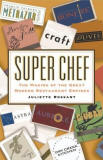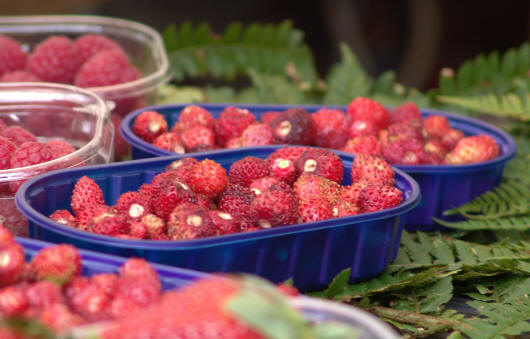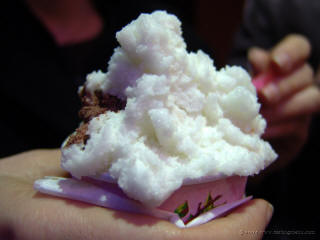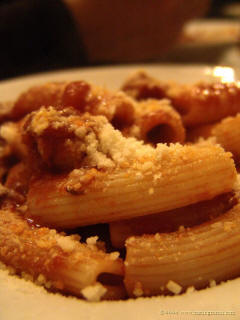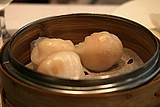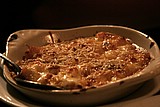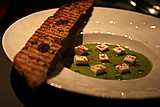Home |
Restaurants by City
|
Food Photography |
Archive | Philosophy |
![]()
Right now we are eating in Seattle, Washington.
|
Thursday
2004
Permalink
|
A few months ago I agreed to check out Super Chef, The Making of the Great Modern Restaurant Empires, by Juliette Rossant. I generally avoid spending a ton of time writing about things I don’t really enjoy, but I feel like there are some important things to learn from Super Chef. More on those later. Firstly, the title. Super Chef. Already I’m slightly irritated as I don’t really know what it means. It’s not that I have a problem with calling out certain chefs as superlative. Certain chefs deserve those accolades. It may just be my perception, but calling the top celebrity chefs “Super Chefs” seems slightly affected, and feeds into this notion that a) you have to be a celebrity chef to make great food, or b) all celebrity chefs make great food. I admit this may just be me being oversensitive, but I can’t help the way I reacted to the title. The book covers several chefs: Wolfgang Puck, Charlie Palmer, Todd English, Milliken and Feniger, and Tom Colicchio. The first thing that struck me was that I’d eaten at five of these chefs restaurants (Chinoise and Wolfgang Puck Express, Aureole, Border Grill, and Craft) and had mediocre meals. Now I have no doubt that each of these Chefs in their own right can cook up a storm. But this is in fact the point. These chefs create food experiences with their names on them, and yet the quality of the food (that I experienced) paled in comparison to what the namesakes of the restaurants can make with their own hands (I assume). And ironically, this really was the theme of the book for me. Read on as Juliette Rossant tells the story of six chefs who used to make great food and now are too busy running their “modern restaurant empires” to do any actual cooking. These chefs swear up and down that their contribution to their empire is strict quality control. There are passages describing how meticulously the “super chefs” train their chefs who cook under their name in other cities. But after a) eating in some of their restaurants, b) reading sections describing the details of Wolfgang Puck lending his name to a line of canned soups, and c) hearing about chefs show up once or twice a year to train staff on a cruise ship, or making airline food, the entire affair simply sounds unappetizing. I'm not saying I have a problem with canned soup, or food on cruise ships. I just started to wonder, what really was the Wolfgang Puck "experience" if you could put it in a can? In some ways the book reminded me of the tv show “The Restaurant”. It was contrived but fun “drama”, but most disappointingly, the food did not look appetizing. Though I watched the show I had no urge to go eat at Rocco’s. The same was true of the book. Though I read it, I had no desire to eat at any of the restaurants described in its pages. So halfway through reading the book and thinking about how uninterested I was in eating any of Wolfgang Puck or Tom Colicchio’s “fast casual” food, I realized that Juliette Rossant was a business reporter. This book wasn’t about food, it was about the business of food. Fine. I like reading about business. I reframed my expectations for the book and read onward. And again, I was disappointed. As unappetizing as the food sounded, the business practices of many (not all) of the “Super Chefs” in question often seemed random and dopey. None of the chefs seemed to be super impressive business people from the descriptions in the book. Many of them, Milliken and Feniger and Todd English specifically, seemed to make every step in the restaurant business a painful misstep. From growing too quickly, to making naïve decisions about personnel, to getting enamored with their own celebrity, etc. I'm not saying they are bad business people, I'm saying that this is the impression I got from the book. Super Chef was neither an exciting behind-the-scenes look at the food that built these careers, nor was it a particularly illuminating view into innovative and consistently successful businesspeople. I read the whole thing, so you don’t have to. I wish the book had gotten either more hardcore about the detail of the food (and the quality of that food) that it described, or focused on people who really were business leaders you could look up to. I suppose since I have yet to either cook or run a business as well as any of the people covered in the book, people may question my judgment. That said, I can read, and from what I read, the book did seem neither a food book nor a business book to me. In the end, whether it was the awkward writing, the impression that I got that the author was trying to sound objective but was really enamored of her subjects (pick one please), or the fact that I never knew whether I was supposed to be excited about the food or the business of food, the book felt to me like the food and chefs it was describing – a lot of stuff thrown together to see what would stick. It's funny but if only the premise had been different, I might have actually enjoyed reading the book. The theme that kept hitting me over the head as I read the book was how incompatible expertly hand-crafted food and large-scale business seem to be. I would really have loved to understand not just how chefs have failed to scale their business while maintaining quality, but understand much more about some of the successes (if there are any). Now that would be interesting, and understandable.
|
|||
|
Tuesday
2004
Permalink
|
Here's a shameless plug. The Accidental Hedonist is hosting voting on the best food blogs of 2004. Anyone can vote, so please do so - here. Especially as we've been nominated for "Best Food Blog - Restaurant Reviews". Thanks! ∞ I'm not a huge chocolate-mint combination fan, and while it may be the wonderful photography, these cookies do look good. ∞ A la Carte presents Odds and Ends - a collection of recipes that didn't fit into any other articles. I love how understated the text is on this site. "Oh, here are a few recipes I had lying around." What you get is a gorgeously produced, beautiful collection of recipes each not only with back stories, photographs, and detailed instructions, but in this case, each dish has its own logo. It's own logo!!! Some days you have to take a moment to marvel about the wonder of what is available for free on the internet. Definitely check out the saucisse de Montbeliard (wait for the logos to change until it gets to this one), the sausage looks delicious.
|
|||
|
Thursday
2004
Permalink
|
Mountain Strawberries, Rome, Italy, March 19, 2004 — Our second day in Rome found us wandering around an outdoor market. We happened upon something I'd never seen before. I know there's tons of produce I've never encountered, but I expect to find that in Asia, not in Europe. I figured in Italy maybe there would be a bunch of cool new breeds of tomatoes I'd never eaten. Maybe some zucchini. Instead I got to try Mountain Strawberries - Fragoline di Monte.
Not a huge amount to share about these other than they were adorable, and while they were fresh and delicious, they tasted almost like strawberry flavored gum. Almost fake. Weird and neat at the same time.
|
|||
|
Wednesday
2004
Permalink
|
We're taking a little break from Italy today for some comic relief. I've linked to this site before, but it bears repeating. I refound this site from www.iheartbacon.com who had a link. The site is thesneeze.com. The Sneeze is not a food site per se but it is absolutely hysterical. That said, Steve, its author does have a special subsection called "Steve, Don't Eat It!" which is what garnered it a mention on this site. Or at least, that's the pretense. The real reason I'm linking to it is that it's funny as hell. Some choice quotes from the food-related entries (where Steve eats gross stuff and let's you know how it went):
It gets even better when you read the entire writeups, which I wholeheartedly recommend.
|
|||
|
Tuesday
2004
Permalink
|
Mariotti Caffeteria Gelateria, Rome, Italy, March 18, 2004 — I suppose it's naive and borderline silly to get super excited about the first gelato I ate in Italy. However, I don't think my senses completely left me. And this stuff was fantastic. I still am not 100% sure about the technical definitions of gelato and sorbetto. This webpage takes a stab at some definitions. Needless to say, technicalities aside, Mariotti had (roughly) a billion different flavors to choose from. The Lemon had a nice strong flavor filled with smooth lemon goodness. It was slightly tart. The Chocolate was rich dark amazing (so good in fact that it was eaten by the time I tried to snap a picture of it). The Cassata alla Ricotta was a bit freaky and chock full of candy bits. I really enjoyed the Hazelnut Chocolate. It was like a Ferrero Rocher gelato. Finally, we tried the strawberry. I truly contained the essence of a perfect fresh strawberry. Weird. So odd for a fresh fruit flavor to come through so quickly in a frozen form. OK. Maybe not weird per se, but certainly atypical. We're only a few hours into our trip to Italy and we've already had a fantastic home cooked meal at an unmarked back alley restaurant, and we've proven that this country takes it's ice cream very seriously. Dense, creamy, delicious. I'm excited for what tomorrow brings.
|
|||
|
Friday
2004
Permalink
|
da Alfredo e Ada, Rome, Italy, March 18, 2004 — We'd landed just a few hours earlier and needed to go somewhere for dinner in Rome. With ten short days in Italy I'm not one to leave anything to chance. (OK, even when we spent a month in London I planned all our meals ahead.) I'd heard through folks that there was this tiny little unmarked restaurant run by a pair of grandmother's. I heard the kitchen was tiny, cooking was done on hot plates, and they stopped accepting customers when the fantastic home cooked food ran out for the night. This was the place for me. Finding da Alfredo e Ada was a significant challenge in itself. And surprisingly, it wasn't because I'd never been to Rome, or the taxi drivers drove like maniacs down the narrow streets. It was because there's no sign in front of the restaurant. The light was warm as we entered and after we confirmed that we were in the right place (in our broken Italian) we were immediately seated at a long table. Within seconds a cask of the house-made wine showed up. I'm not entirely sure how to describe this wine. It was like someone made wine from concentrate. I almost imagined that after I took a swig Kool-Aid Man might burst through the far wall. The wine was a weak white wine, that tasted slightly diluted, but was served cold, was slightly acidic, and actually ended up being a good balance with the food we ate. Speaking of the food, it started coming. Big plates with heaping portions of pasta and meat. There were no menus so we waited for the night's dishes. First was Macaroni con Itsubo Involtini. (I apologize if I spelled it wrong. In my eating frenzy, sauce and cheese flew in all directions including the spot I wrote down the name of this dish.) Basically it was big rigatoni in a super light tangy sauce. It was super cheesy and studded with big chunks of a fatty (in a good way) meat. While we were eating Ada darted around the restaurant moving from the kitchen to various tables making sure everything was running smoothly. As best I could tell the Alfredo in "Alfredo e Ada" had passed away. But Ada didn't miss a beat. She had help from two other women, one who also looked like somebody's grandmother, and a younger woman running food out to customers. As we were waiting for the next course, Ada caught our eye from across the restaurant and waved to DebDu to come to the kitchen. Debdu made her way over and returned with her plate of food. One by one we all went to the kitchen and came back with our dishes and big smiles on our faces. Half of us got Veal with Pork Sausage, Kale, and Peas. The other half got Beef Brisket Roulade with Red Beans and Red Sauce. Given how rustic the dishes were they were surprisingly light in touch when it came to flavor. This is not to say they didn't have flavor. They had plenty. It's just that the flavors were surprisingly lithe in the dishes, dancing around each other distinctly. The veal was (as they say) like butter and almost sweet. The sausage had a slight and enjoyable spiciness on the finish. The red sauce on the beef was the same as we had on the pasta and we were happy to see a repeat performance. The dish had interesting islands in its own complex flavor ecosystem. While the pseudo-professional responsibility that comes with this food blog was certainly a factor, I was really just dying to really check out where all this great food was coming from. Sure enough, the kitchen was tiny. And yes, there were hotplates in the corner. Tell that to people who need Viking and Wolf ranges in their houses. The night's food sat in the kitchen waiting to be served. And there wasn't much left. We were lucky we got there when we did. Three women made, served, and cleaned up 30 dinners. Wow. Finally, Ada delivered some sugar ring cookies to the table. She demonstrated that we were supposed to dip the cookies in our wine. The combined flavor was sugary, crispy, light, and yummy. DebDu said it was like dunking graham crackers in apple juice. Ada came and wrote the bill on the "tablecloth" along with what appeared to be her trademark caricature of herself. Is it too much to ask that grandmothers' across the United States open up small, unmarked restaurants where they serve their wonderful homecooking honed over decades of making people happy to happy customers? American diners are way too concerned with the "scene" and mojitos. It was our first meal in Italy and I was happy.
|
|||
|
Monday
2004
Permalink
|
Airplane Food, Netherlands, March 18, 2004 — There wasn't really a non-stop flight option from Seattle to Italy so we had to pick a spot to stop. We ended up flying on Northwest/KLM through Amsterdam to Rome. I have tried to be disciplined about not asking you to spend your valuable time listening to me complain about airline food. Anyone who deems themselves good enough to get on stage at amateur night in their local comedy club has already covered that material in detail. However, when you eat something good on an airplane you should call it out. Airline meals are constrained by a series of challenges. You can't really cook anything on the plane, so all food must be made in advance. And then the airline equipment for cooling and heating food appears to have only two settings - frostbite cold, and corona hot. Invariably the wilted lettuce of your salad has some crystallized ice on it, and your hot "entree" looks like the surface of another planet. Just wait a few minutes and both will arrive at a more reasonable temperature. Unfortunately the food doesn't get any better in that time. And sure enough, our flight from Seattle to Amsterdam on Northwest had absolutely vile food. For some reason, despite the limitations, airlines insist (or customers demand) facsimiles of meals that should only be cooked in a real kitchen. Not warmed in an airplane galley. And yet, why is it that with non-U.S. airlines, I always have (and am often rewarded with) better quality plane food? I can't help but suspect it has something to do with the American obsession around quantity over quality. But whatever the reason, I always expect it to be better on flights originating outside the U.S. Not great food, but at least not completely atrocious. Our flight from Amsterdam to Rome didn't disappoint. They served us a simple breakfast. There was a box with pre-packaged fruit, yogurt, and muffin. O.K. The fruit was gross, and the cold muffin was too, but the yogurt was fine. But that wasn't the highlight, they also handed out from a basket what they called "cheese blintzes". In actuality they were smaller than fist-size medium brown soft rolls covered with a variety of yummy seeds (sunflower, pumpkin, etc.). In the middle of the bread was a slice of good tasting cheese. And the entire thing had been melted. Basically a simple grilled cheese sandwich, without the grilling, with a half-decent cheese, and a roll with nuts on it for flavor contrast to the cheese. Now this was something the heatboxes on an airplane could cook well. And these simple sandwiches were absolutely delicious. Why airlines think I want some horrifying approximation of pancakes, western omelet, and sausage instead of a simpler dish that might actually taste good, I don't know. Airlines should go with the strengths of their environment as opposed to trying to mask its weaknesses. And by the way, if my flight had departed from an American city, then my "cheese blintz" would have been a slice of orange American Cheese molten between two soggy pieces of a cheap variation on Wonder Bread. Yuck. One summer at summer camp at a certain point we got sick of the food being served in the cafeteria. We had a popcorn popper in our bunk. This wasn't an air popper, but the old kind that had a hot surface onto which you put oil, and then your unpopped kernels. We improvised and used it as a frying pan to make tuna melts. After stealing butter, bread, cheese, and tuna fish from the kitchen, we had some of the most golden and perfect tasting tuna melts I have ever eaten. All made in our popcorn popper. Bottom line: go with your strengths, and something edible may emerge.
|
|||
|
Monday
2004
Permalink
|
Italy, March 11, 2004 — I don't like doing anything half way. And when I'm going to have an experience that I'm really looking forward to, I really want to savor it completely. I'd rather wait awhile to do it, than do it part way now, with a promise of more later. This was the case for me when it came to going to Italy. The land, the language, and most of all the food have been calling to me all my life. And every time I have had an opportunity to go, it's either been for not very long or under circumstances that I felt wouldn't allow me to really enjoy my visit. Finally we had the opportunity to go for over a week, and decided it was time to go. There was a lot of debate about where we should go. South? North? Rome? In the end we decided to head to the region most famous for food (of course) Emilia Romagna. The thing that put me over the edge in deciding to target that region is that it's home to three of Italy's most perfect food: Parmigiano Reggiano from Parma and Reggio Emilia, Prosciutto di Parma also from Parma, and Balsamic Vinegar from Modena and Reggio Emilia. The trifecta! Finally, I decided to do a little reading up on the region. I got Emilia Romagna, Flavors of Italy, Eating In Italy: A Traveler's Guide to the Hidden Gastronomic Pleasures of Northern Italy, Italian Cuisine: A Cultural History (Arts and Traditions of the Table), and Al Dente: The Adventures of a Gastronome in Italy. They helped a bit, but ultimately there's no substitute for being there. We flew through Amsterdam so we could have a little mini-vacation on the way back. What follows is over 20 entries spanning our trip from Rome through Florence to Bologna and the countryside of Emilia Romagna. Enjoy. |
Our Sponsors
Online Loans – Conversion Strategies – College Courses – Surprise Birthdays – Online Trading - Calendar and Event Schedules - Food Events and Calendars - Wine Events and Calendars - Digital Photography Resources - Jewish Gifts and Judaica - Howard Stern Podcast ponytailed blogger Jonathan Schwartz

Browse tastingmenu
Home |
Restaurants by City X |
Food Photography |
Archive | Philosophy |
![]()
Free eBooks: All About Apples
| Autumn Omakase
More:
Discussion |
Cool Food T-Shirts |
Ingredients
| Markets |
Recipes
Search |
Blog FAQ |
Other
Blogs
Best of tastingmenu
|
City View
Entry: July 6, 2006 |
Blue Plate
Entry: June 19, 2006 |
L'Atelier de Joël Robuchon
Entry: July 18, 2006 |
Browse by City
Boston | Chicago | Houston | Las Vegas | Los Angeles | Maui | New York | Philadelphia | Portland | San Francisco | Seattle | Toronto | Utah | Vancouver | Washington D.C.
Bangkok | Beijing | Hong Kong | Seoul | Tokyo
Amsterdam | Berlin | Italy | London | Madrid | Paris | Vienna
Browse by Month
2006
2005
2004
2003
2002
2001
Comments, questions, or feedback:
info / at / tastingmenu / dot / com
All pages Copyright (c) 2001-2006 tastingmenu.com
Last modified 11/27/06.
